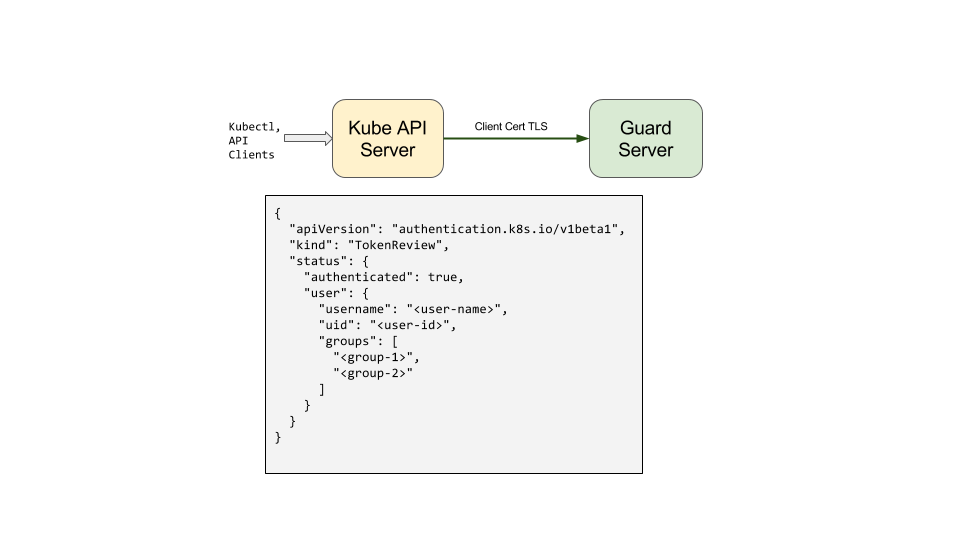Static Token File Authentication
TO use static token file authentication, you need to set --token-auth-file flag of your guard server to a token file.
You can use the following command with --token-auth-file to generate YAMLs for deploying guard server with static token file authentication.
$ guard get installer \
--auth-providers="token-auth" \
--token-auth-file=<path_to_the_token_file> \
> installer.yaml
$ kubectl apply -f installer.yaml

{
"apiVersion": "authentication.k8s.io/v1",
"kind": "TokenReview",
"status": {
"authenticated": true,
"user": {
"username": "<user-name>",
"uid": "<user-id>",
"groups": [
"<group-1>",
"<group-2>"
]
}
}
}
Guard uses the token found in TokenReview request object to get user’s information and list of groups this user is member of. In the TokenReview response, status.user.username, status.user.uid and status.user.groups are set to username, userid and groups found in token file.
Token file
Token file is a csv file containing four columns: token, username, user uid and group names. Group names column may be empty or contain multiple names. Token must be unique for each user.
| username | uid | token | List groups user is member of |
|---|---|---|---|
| user1 | 1123 | alkskjhfdku3jkfhm | test,dev |
| user2 | 566 | kjasdfgjkewyucxmj12 | dev |
| user3 | 7654 | lskdfjldskfnkjhf |
For above user’s, token file is given below:
$ cat token.csv
alkskjhfdku3jkfhm,user1,1123,"test,dev"
kjasdfgjkewyucxmj12,user2,566,dev
lskdfjldskfnkjhf,user3,7654,
Configure Kubectl
kubectl config set-credentials <user_name> --token=<token>
Or You can add user in .kube/config file
...
users:
- name: <user_name>
user:
token: <token>
$ kubectl get pods --all-namespaces --user <user_name>
NAMESPACE NAME READY STATUS RESTARTS AGE
kube-system etcd-minikube 1/1 Running 0 7h
kube-system kube-addon-manager-minikube 1/1 Running 0 7h
kube-system kube-apiserver-minikube 1/1 Running 1 7h
kube-system kube-controller-manager-minikube 1/1 Running 0 7h
kube-system kube-dns-6f4fd4bdf-f7csh 3/3 Running 0 7h
Note: If you set up guard only for static token authentication , then you will need a client cert with
Organizationset totoken-auth. if you set up guard for static token authentication and other auth provider (for example,--auth-providers="token-auth,github"), then at first guard will check for static token authentication if not succeeded then it will check for other provider. And for multiple auth providers, if you set permissions based on group names, then please be aware of same group name from different authenticators.








